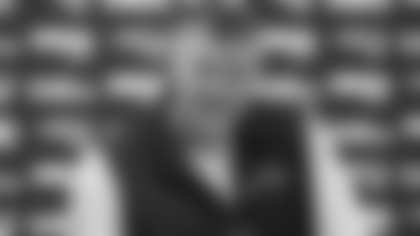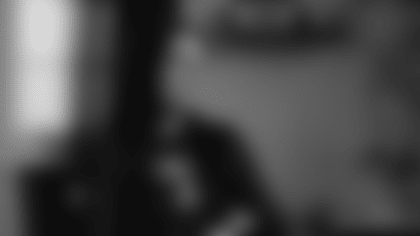HEAD COACH BILL BELICHICK
PRE-DRAFT CONFERENCE CALL
April 13, 2020
OPENING STATEMENT: Let's start by, I send along my best wishes to everyone and their families. Remain safe and healthy. Also, on behalf of the team, just want to recognize and express my appreciation, our appreciation and admiration for all the people whose jobs are to treat people and keep our lives going every day. Obviously, very challenging and we'll keep following the guidelines, but we just want to give a special thanks and shout out to those that are keeping us going and taking care of us and the medical professionals that are doing such a great job. Look forward to getting to the other side of this, but in the meantime, this has really put things in perspective for all of us and appreciate all the hard work that everybody's doing to keep us safe and keep our daily lives going.
At the start of free agency, I made a statement about Tom [Brady]. It would be of course impossible to sum up everything that Tom did in 20 years into a comment, then or now, but I meant everything I said about him and I'm sure we'll be talking about him for years and decades to come. For right now, we're moving forward and focused on the draft here for this call, and that's really where our attention has been and will continue to be is to put the best team [together] in 2020, to do all we can between now and the start of the season. Our preparation is to have our team in the best position to compete in 2020.
In terms of the draft, it's a little bit different logistically over the last month from where we've been in the past. But as usual, Nick Caserio and his staff have done a great job of putting things in order, assembling information, following up on all the many things that we have to try to look at. I know it's not normal, but I think we've had – we've accumulated a lot of information, we've had a lot of opportunities to talk about all the players and all the other things that are involved here in this process, and there will be more as we go forward between ourselves and the league and with other teams and so forth. So, still have some work to do in that area in terms of just seeing exactly how everything's going to function. We've talked about it and have an idea, but we'll actually put it into place early next week and just see exactly how it's going to go. But, I'm sure that it's all well thought out and organized from a league standpoint, and we'll just do our part when we're involved in the process. That's really about where we are here and there's some things going forward that haven't been detailed out yet in terms of logistics and specific communications and so forth, but I think the general idea is to handle this the way it's been handled in the past. We just can't be together, so we'll communicate in other ways to be able to exchange ideas and opinions and thoughts and make decisions. So, that's where we are now.
Q: What stands out to you about this year's quarterback class in the draft?
BB: I think similar to most years. There's quite a range of players and some of the systems that they play in in college are different, either than what we run or what traditional NFL systems would look like, and some are more closely schematically to that. Each guy has his own set of skills; he has his own circumstances. Some players have played well over a sustained period of time; some players have had an exceptional year in the past year or two – maybe 2019, in some cases 2018 – and then for whatever the reasons were, the two years didn't quite match up. But, that's I'd say about the way it always is. There are always a variety of things you have to try to put together and look at, but certainly there's a lot of interesting players and guys who have really good arms, can really throw the ball and some very athletic players, some players that have won a lot of games and have shown their competitiveness and instinctiveness. So, interesting group and probably one that has decent depth to it.
Q: How much have you used technology to get to know these players? How much do you have to sacrifice in terms of trying to get to know a player, knowing it's not going to be the same as going to a pro day or meeting them face to face?
BB: Yeah, Mike [Petraglia], that's an interesting question. It's a little bit different than the way we've done it in the past with the 30 visits and the pro days and so forth, but all the teams are working with the same constraints. So, in fact, we probably talk to as many if not more players than we have in the past when you're not traveling and you're just sitting at a desk or sitting in a room, wherever we are. It's easier to make a lot of phone calls and get in contact with people rather than sometimes visit a place and just see the people that are there, even though those visits are valuable and you're able to get into more of an in-depth conversation and evaluation there. So, we certainly have logged a lot of phone time and FaceTime and whatever video conferencing and so forth. You know, again, I think for the most part, we've all adjusted to that and tried to take advantage of the opportunity that we have to do those things.
Q: Is part of that opportunity watching more film? Or would you have watched the same amount of film this offseason if it weren't for being at home?
BB: I think we've probably seen a little more. I mean, we started a little bit earlier this year unfortunately, so we were further ahead in January in terms of evaluating draft and free agent players for this year. But, yeah, I mean, maybe a little bit more.
Q: Did you guys have a desire to bring Tom Brady back this coming season?
BB: Yeah, that's water under the bridge, Mike [Giardi]. Like I said, we're really focused on this season and trying to look at our opportunities and make decisions and plan and prepare to be as competitive as we can be this year. So, that's really what our focus is on.
Q: Did it surprise you at all, him leaving?
BB: Again, I think we've covered all that.
Q: In your special with Nick Saban, he mentioned that a lot of NFL coaches don't call the head coach prior to a draft to talk about certain players. How important is that to you? Do you even talk to position coaches? Is it the same this year, or do you rely on that more because of the lack of being able to get hands on with some of these prospects?
BB: Yeah, Dan [Roche], I think it's always a part of it. I think a lot of that probably depends on your relationship with the head coach you're calling and how well you know each other and so forth. So, with somebody like Nick, we've known each other for call it 40 years. That's a lot different than calling somebody that you've never met before. They may have some insight into the player and all that, but you just don't know each other as well and there's – I'm not saying intentional, it could be a very unintentional gap – but what they're looking for, what you're looking for is sometimes not always the same thing. There's nothing wrong with that. But, again, the relationships that all of us have with people over an extended period of time where you have a lot of history of, in our case, players and their situations and their skills, you can compare them relative to other guys that we know and so forth. I think there's just a natural level of comfort there, and certainly there is with myself towards Nick. There's nobody I have more respect for, but I also have a great personal relationship with Nick and I value his opinion very, very highly.
Q: Because of the circumstances this offseason, have you mastered the technique of all this technology that you maybe have not bothered with over the years?
BB: I'd say master is probably not the right word, Dan, but I'm certainly better at it than I was four weeks ago. I mean, I didn't know what half of this was. But, at least now I can do more than I did, let's put it that way. So, I get a little better every day – learn a new button or learn a new thing to click on and see what trick that does. So, yeah, it's been very, very educational as a first floor, maybe even the basement – I've lived below the first floor. Yeah, it's been interesting to get educated on different technologies. Dan Famosi has done a tremendous job for us because he's had to navigate a lot of this. I mean, there's the coaching side of it, there's the scouting, there's the playbook and preparing for the offseason program side of it, meetings and so forth. Just to be able to deal with so many people that are – some are very proficient at some of the things we're doing, and others, like myself, are remedial. And so putting things together on a lot of different levels for multiple groups and interactions that cross over different connections and needs and 'can we do this with this type of meeting and this kind of conversation and can we do something else' – you know, some are one-on-ones, some it's five people, 10 people, 20 people, and we're preparing for larger groups than that. So, there really are a lot of moving parts, and Dan's done a tremendous job for us and tried to pull a lot of things together and remotely help out people like me that need a lot of help.
Q: You've always talked about value. Are there some years where your needs, where you're drafting and the players that are available determine value? Is year one of those years, where you pick at 23 and not again until 87?
BB: Yeah, that's a real good question, Alan [Segel]. That's something we'll have to take a closer look at. I think up until, I'd say, about, [inaudible] in a couple days, most of our folks are trying to learn as much as we can about the players, have them evaluated and valued properly and so forth. I think as you get in the final week or three or four days prior to the draft, then draft strategy and things like that starts to come a little bit more into focus because you have a better idea of what the options are and where you'd be comfortable doing certain things. And I think other teams are falling into the same category as we are, that they're starting to figure out whatever their situation is. So, we have a lot of draft picks. Some of them are kind of more in a certain area. As you said, we have a little bit of a void there in the second round, although that player – [Mohamed] Sanu – filled a need for us, so that's OK. But in terms of just the draft strategy and so forth, yeah, things start to pick up here in the next probably – I don't know – around the weekend or maybe after the weekend in the two or three days leading up to the draft.
Q: Due to the circumstances of this offseason with no conditioning, the facilities closed, your current players not being present or under the supervision of your staff, how does that complicate your evaluation of the players you know are coming back? With some of the uncertainty regarding what lies on the horizon beyond the draft, such as OTAs and minicamp, does that factor into your draft strategy, particularly as it comes to developing young players?
BB: Yeah, Bob [Socci], that's really a good question and something we've talked about. Really the answer for us is how to try to maximize the opportunity that we have. If you compare this year to the lockout year, everybody had a lot of facilities available and they could work out wherever they wanted. That's more limited this time, but we weren't allowed to have any contact with the players. We couldn't talk to the veteran players, we couldn't talk to the first-year players, and in fact we couldn't even sign the players that weren't drafted until right before training camp. So, the opportunity to communicate and teach was very, very limited then. Now, I'd say we're looking at a situation where the opportunity to train for some players may be more limited, but our opportunity to communicate with them and teach them, even though it's remote, is infinitely better than what it was during the lockout. So, we'll just have to see how all that plays out, but I do think that from a teaching standpoint, we can get a lot of teaching done that we weren't able to do nine, 10 years ago in a similar but different situation. I think with the teaching part that we'll hopefully be OK. I think the fundamental part of it, the execution part of it, the timing and so forth is going to be probably similar to what it was in the lockout in 2011 when you're just dealing with training camp and you have to really accelerate the teaching or the execution and the teamwork and so forth – you just don't have that good base to fall back on that we've been used to in the spring. At least, it doesn't appear that way now. Maybe that will change, maybe we will be able to work with the players – we'll have to see how all that goes – but even if we don't, relative to the 2011 season, I think we'll have a better opportunity to teach. And that's what we're focused on in the spring is to get as much teaching done as we can and then we'll see what kind of opportunities we have to actually work on the field.
Q: You mentioned it's an interesting quarterback class. How willing do you feel like you and your staff will need to be moving forward when it comes to that position and maybe altering your offense a little bit, with more athletic styles of quarterback coming through the draft each year? How important is it to be open to changing the system you've built for two decades with one guy primarily playing the majority of the snaps there?
BB: Right, yeah. Exactly, Phil [Perry]. I couldn't agree with you more in terms of over the last two decades, everything we did, every single decision we made in terms of major planning, was made with the idea of how to make things best for Tom Brady. Now, with that being said, we've had several situations where we had to play and we knew Tom wasn't going to be the quarterback. So, that would go back to [Matt] Cassel and Jimmy [Garoppolo] and Jacoby [Brisset] and situations like that. And so, in those situations, now they were in season – although Matt Cassel's situation ended up being for 15 games – but whatever those situations were, we adapted what we had to the player and – Cassel would be a good example – we geared everything towards doing what was best for him, just like we always geared everything for doing what was best for Tom and to help our offense there. I don't really see that changing. Whoever the quarterback is, we'll try to make things work smoothly and efficiently for that player and take advantage of his strengths and his skills. Each of us has different skills. Each quarterback has a different skillset, and whatever things that particular player does well, we'll try to work towards and feature, or at least give him an opportunity to do those. And the things that either he doesn't do well or needs more experience at or whatever the case might be, then we'll try to minimize or until those things improve, work around them. So, I don't see it being any different, the process, than what it's ever been. It's just we know the situation we're in now is different than the year when we had to plan to play four games without Tom at the start of the season, but he would be back after that. This is a little bit different than that, but along the same lines as we get whoever is the quarterback ready, ready.
Q: This will be the first time in 20 years you'll have a new quarterback. Does that change how you scout other positions in the draft or free agency or change what you're looking for in certain players?
BB: I mean, not really. Again, we know the things we need to do to have a good team. We have to be able to protect the quarterback, we have to be able to run the ball, we have to be able to get open and catch the ball with whoever the receivers or tight ends or running backs are. We have to be able to play defense against all the teams we have to play against. So, I think those things will come into play more as we get on the field in training camp and start game planning and being more specific. Again, I think the spring is always the time for the players to learn the offense, to work on their fundamentals, their basic techniques and the refinement all comes at a little later point in time. If we don't have an opportunity to do that this spring, then there's nothing we can do about that. We'll deal with it in training camp. But, before we can start getting too fine-tuned and too specific, we all need to understand the basics, the fundamentals, the basic communication, the fundamentals of our technique, the fundamentals of the running game, the passing game, so forth, and then we'll tailor those to an individual player, whatever position it is – whether it's a receiver or a quarterback or whatever it is. Randy Moss and Wes Welker might run the same route, but it's not the same route. So, that comes later. I don't think you start at that point. That's something after you get the basics down that you modify for an individual player's skills.
Q: What was your impression of Jarrett Stidham during his rookie season, and do you feel like you have a good grasp of him as a player even though he's only thrown four passes in a regular season game?
BB: Well, we've spent quite a bit of time with both Brian [Hoyer] and Stid. I think we have a pretty good – Josh [McDaniels] and myself – certainly have a pretty good feel for both those players. The circumstances will be different this year and we'll see how everything plays out. But again, to start with, I think the main thing is to give everyone a chance to compete, to get people comfortable with the position and the skills that they're playing, the communication that's involved. We'll evaluate the players as we get an opportunity to evaluate them. So, right now, the spring will be about teaching the best that we can. At whatever point we get a chance to get on the field and participate and play, then that's what we'll do. But, not sure exactly how that's going to go. Once we figure it out, then we'll work from there.
Q: When doing self-scouting relative to the draft, have you seen anything you're doing that you could do differently to have different results, specifically with the second round where you've frequently gone with defensive backs?
BB: Yeah, well, we evaluate everything we do and are always trying to learn from every situation to improve. We've done that every year since I've been here. We'll continue to do it and we'll do the best we can this year, so we'll see how it goes.
Q: Is there anything on that group specifically? Is there any philosophy you have to go with defensive backs in the second round?
BB: Yeah, well, you've got guys like Matt Light and Jamie Collins and Rob Gronkowski – there's plenty of second rounders that had good careers here. So, we'll see how it goes. But, look, each draft is different, every year is different, each player is different. So, I think to sit here and rehash the 2015 draft or the 2006 draft or whatever it is – again, there are fundamentals to the process and we always try to improve those. So, we'll try to do the best job that we can this year in every round – first round, second round, if we're in the second round. Right now, we're not even in the second round. But, whatever rounds we're officially in, we'll try to maximize the value and help our team the best that we can.









































